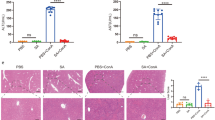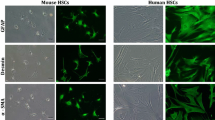Abstract.
During an acute, systemic inflammation, the liver is triggered by blood-borne pro-inflammatory cytokines such as Tumor Necrosis Factor α, Interleukin-1β and Interleukin-6. The end result is an up- or down-regulated synthesis and/or activation of liver-enriched transcription factors that in turn regulate many target genes coding for resident or secreted acute phase proteins. In this review, various classifications of these acute phase proteins are presented. Major inflammation-driven changes in the synthesis and/or activity of the hepatic transcription factors are illustrated. Some of their up- or down-regulated target genes are used as paradigms of the various transcriptional mechanisms that take place on gene promoters during an acute, systemic inflammation. Finally, further specific features of inflammation-associated gene transcription in liver from acute phase onset to resolution are provided.
Similar content being viewed by others
Author information
Authors and Affiliations
Additional information
Received 10 September 2000; returned for revision 17 January 2001; accepted by M.J. Parnham 25 April 2001
Rights and permissions
About this article
Cite this article
Ruminy, P., Gangneux, C., Claeyssens, S. et al. Gene transcription in hepatocytes during the acute phase of a systemic inflammation: from transcription factors to target genes. Inflamm. res. 50, 383–390 (2001). https://doi.org/10.1007/PL00000260
Issue Date:
DOI: https://doi.org/10.1007/PL00000260




